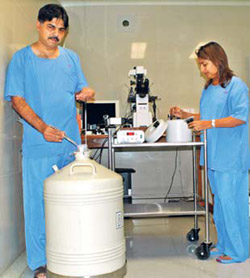
Doctors say women with busy lives may not have the time to catch up with their ticking biological clock, and fertility may be the price they pay. Dr. Nandita Palashetkar, IVF Center, Lilavati Hospital, says “The biological clock keeps ticking irrespective of external factors and stress and stops by the late 30s or early 40s.â€
How it Works:
Fresh ova are retrieved from the donor and then frozen and stored in the egg bank. After four months the donor is tested for HIV and if the test comes out negative, then these quarantined eggs are thawed and used after ensuring that the eggs are totally free from the possibility of transmitting HIV.
Who can donate?
Voluntary Donors: Donors need to be in the age group of 21 to 33 years, preferably married and having finished their childbearing functions. The woman will have to undergo 11 days of injections, ultrasound monitoring, anesthesia, surgical transvaginal ultrasound egg retrieval and a short four hours in the hospital.
Shared Donors- These are young patients who are also trying to get pregnant through IVF/ICSI (Intra Cytoplasmic sperm injection. Theses patients are known to produce many eggs, while undergoing ovarian stimulations. Half these eggs are kept for the patient herself and the other half is donated to a recipient. The recipient in turn spends for half the cost of the donor.
How is it done?
The patient is given hormone injections to produce eggs
The eggs are then retrieved with the help of an ultrasound machine. This procedure then takes around 20 minutes and is performed under general anesthesia. The patient is discharged after three hours.
These eggs are then dissected by the embryologist in the IVF lab. The mature eggs are identified and prepared for freezing.
How does the ova bank function?
The dissected eggs are frozen in a straw after a special procedure; the temperatures are gradually dropped down to -80 degrees centigrade with the help of an automated freezer. Following this, rapid freezing is done to -196 degrees centigrade in liquid nitrogen containers. These eggs can be stored in the containers for 10-15 years.
